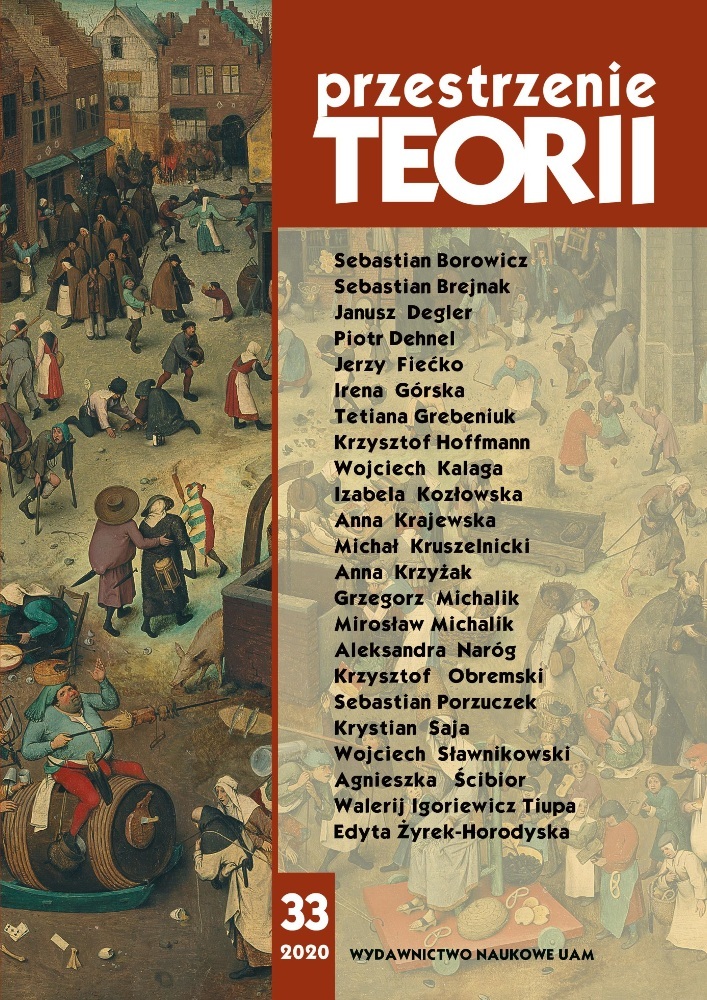Abstract
The ethics of Emmanuel Lévinas – the idea of asymmetrical, unconditional responsibility for and devotion to the Other – is founded on the dichotomy between the Same (I) and the Other. The objective of the article is to demonstrate that, in spite of this dichotomous foundation, Lévinas’s argument paradoxically eludes the binary logic of the Western logos. Employing the ‘close reading’ method with Otherwise than Being or Beyond Essence, the author shows how Lévinas’s way of thinking and the main concepts of his argument situate themselves beyond binary oppositions – in the realm of the excluded middle or, otherwise, in the realm of the Third, construed as transgression of dichotomies. The main argument is preceded by a discussion of the antinomies introduced into the I-Other relation by the appearance of the Third construed as the Third Party (le tiers).
References
Bergo B., Levinas between Ethics and Politics. For the Beauty that Adorns the Earth, Dordrecht, Boston, London 1999.
Bernasconi R., The Third Party. Lévinas on the Intersection of the Ethical and the Political, “Journal of the British Society for Phenomenology” 1999, no. 1 (vol. 30), s. 76–87.
Blanchot M., Le pas au-dela, Paris 1973.
Derrida J., Χώρα / Chora, przeł. M. Gołębiewska, Warszawa 1999.
Fagan M., The Inseparability of Ethics and Politics: Rethinking the Third In Emmanuel Lévinas, “Contemporary Political Theory” 2009, no. 8, s. 5–22.
Gadacz T., Czy bycie jest złe? Doświadczenie il y a i uciekania w filozofii Emmanuela Lévinasa, „Kronos. Metafizyka, Kultura, Religia” 2011, nr 2 (17), s. 230–236.
Kalaga W., Blanchot: Trzecie między zaimkami, „Teksty Drugie” 2018, nr 4, s. 310–332.
Kowalska M., Dialektyka poza dialektyką. Od Bataille’a do Derridy, Warszawa 2000.
Lévinas E., Całość i nieskończoność, Warszawa 1998.
Lévinas E., Etyka i nieskończony, Kraków 1991.
Lévinas E., Inaczej niż być lub ponad istotą, przeł. P. Mrówczyński, Warszawa 2000.
Lévinas E., O Bogu, który nawiedza myśl, przeł. M. Kowalska, Kraków 1994.
Mayama A., Emmanuel Levinas’ Conceptual Affinities with Liberation Theology, New York, Frankfurt, Oxford 2010.
Migasiński J., O pojęciu sprawiedliwości w pismach Emmanuela Lévinasa, „Etyka” 2014, nr 49, s. 83–96.
Migasiński J., W stronę metafizyki: Nowe tendencje metafizyczne w filozofii francuskiej połowy XX wieku, Toruń 2014.
Peperzak A., To the Other: An Introduction to the Philosophy of Emmanuel Levinas, West Lafayette, Indiana 1993.
Simmons W.P., The Third. Lévinas’ Theoretical Move from an-archical Ethics to the Realm of Justice and Politics, “Philosophy and Social Criticism” 1999, no. 6 (vol. 25), s. 83–104.
Skarga B., Emmanuel Lévinas: kultura immanencji, [w:] B. Skarga, Tożsamość i różnica: eseje metafizyczne, Kraków 1977, s. 92–113.
Szabat M., Przemiany il y a w filozofii Emmanuela Lévinasa, „Sztuka i Filozofia” 2011, nr 38, s. 64–76.
Vries H. de, Adieu, à dieu, a-Dieu, [w:] Ethics as First Philosophy. The Significance of Emmanuel Lévinas for Philosophy, Literature and Religion, ed. A.T. Peperzak, New York and London 1995, s. 211–221.
Waligóra M., Etyczny projekt Emmanuela Lévinasa – fenomenologia czy antyfenomenologia?, „Fenomenologia” 2008, nr 6, s. 43–65.
Włodarczyk R., Lévinas. W stronę pedagogiki azylu, Warszawa 2009.
License
Authors
Authors of texts accepted for publication in Przestrzenie Teorii are required to complete, sign and return to the editor's office the Agreement for granting a royalty-free license to works with a commitment to grant a CC sub-license.
Under the agreement, the authors of texts published in Przestrzenie Teorii grant the Adam Mickiewicz University in Poznań a non-exclusive, royalty-free license and authorize the use of Attribution-NonCommercial-NoDerivatives 4.0 International (CC BY-NC-ND 4.0) Creative Commons sub-license.
The authors retain the right to continue the free disposal of the work.
Users
Interested Internet users are entitled to use works published in Przestrzenie Teorii since 2015, for non-commercial purposes only, under the following conditions:
- attribution - obligation to provide, together with the distributed work, information about the authorship, title, source (link to the original work, DOI) and the license itself.
- no derivatives - the work must be preserved in its original form, without the author's consent it is not possible to distribute the modified work, such as translations, publications, etc.
Copyrights are reserved for all texts published before 2015.
Miscellaneous
Adam Mickiewicz University in Poznań retains the right to magazines as a whole (layout, graphic form, title, cover design, logo etc.).
